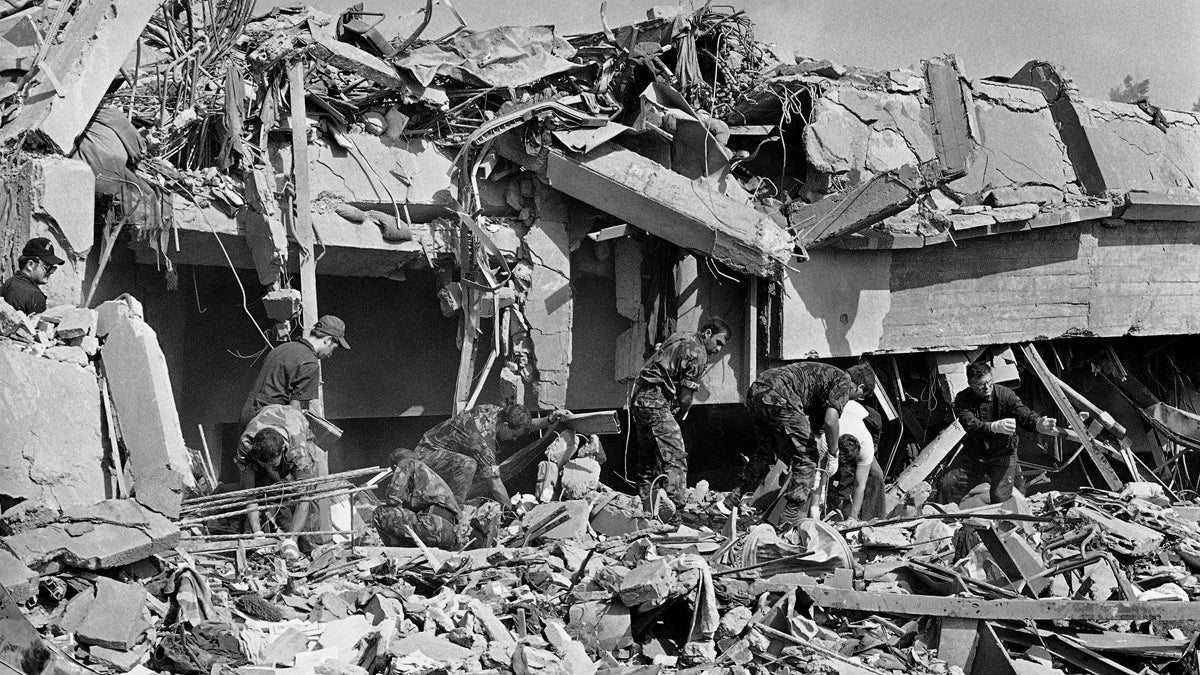From Beirut to Benghazi: The increasing politicization of tragedy

In this Sunday, Oct. 23, 1983, file photo, rescuers prepare to lower a U.S. Marine on a stretcher down to safety below, in Beirut, Lebanon, following a truck bomb attack on the Marine barracks near the Beirut airport. The blast _ the single deadliest attack on U.S. forces abroad since World War II _ claimed the lives of 241 American service members. (Bill Foley/AP Photo, file)
Gee, what a surprise: The new special House committee on Benghazi, otherwise known as the Plot to Slime Hillary Clinton In Advance Of 2016, will be buttressed by a new Republican super PAC that says the probe “will not reflect well on Hillary Clinton.
And gee, what a surprise: The probe hasn’t even started, yet the super PAC’s strategist has already announced its verdict.
It’s been obvious for weeks that the new House committee is just a partisan front – the super PAC’s website declares that the panel’s dominant Republicans “may be the only people standing between Hillary Clinton and the White House” – and that the odds of finding a Benghazi smoking gun are preposterously low. Especially since we’ve already had 13 hearings, 50 briefings, and 25,000 pages of documents.
How sad it is that Washington has devolved into such a partisan swamp, where even the tragic deaths of Americans become grist for the permanent campaign.
Yeah, I know, the capital has always been swampy. True that. But there once was a time – I’m talking only 30 years ago – when our elected leaders didn’t instantly storm the partisan barricades when Americans were killed by terrorists overseas. Just take a look at what happened after 241 Americans were blown up in Beirut by a suicide bomber who had breached the Marines’ compound.
I recommend that you read Jane Mayer’s recent recounting in The New Yorker, because back then she worked the terrorism beat. Six months before those Americans died, terrorists had already killed 17 Americans – including seven CIA officers – while bombing the U.S. embassy in Beirut. President Reagan, in other words, had already received fair warning about security flaws. Clearly, his administration didn’t do enough to prevent the subsequent, far more bloody event at the Marines’ compound on October 23, 1983.
But did the dominant House Democrats commence partisan warfare and try to slime Reagan during the runup to ’84 presidential race? Nope.
Mayer writes:
There were more than enough opportunities to lay blame for the horrific losses at high U.S. officials’ feet. But unlike today’s Congress, congressmen did not talk of impeaching Ronald Reagan, who was then President, nor were any subpoenas sent to cabinet members. This was true even though then, as now, the opposition party controlled the majority in the House….Instead of playing it for political points, a House committee undertook a serious investigation into what went wrong at the barracks in Beirut. Two months later, it issued a report finding “very serious errors in judgment” by officers on the ground, as well as responsibility up through the military chain of command, and called for better security measures against terrorism in U.S. government installations throughout the world. In other words, Congress actually undertook a useful investigation and made helpful recommendations. The report’s findings, by the way, were bipartisan.
You see where I’m going with this.
The report was finished, sans partisan fireworks, by the end of ’83. But three months later, terrorists in Beirut kidnapped, tortured, and murdered the CIA station chief. Did congressional Democrats assail Reagan as “weak” for failing to tighten security in accordance with the report’s recommendations? Nope. Indeed, Mayer writes, “Congress held no public hearings, and pointed fingers at the perpetrators, not at political rivals.”
Wait, we’re not done. Eleven months after the Beirut bombing – in September ’84, in the midst of the presidential campaign – terrorists struck in Beirut yet again, bombing another American outpost. The press asked Reagan why these attacks kept happening and why hadn’t security been tightened. Reagan came up with a classic response (even though, in that less hyperpoliticized era, it never became an issue in the ’84 campaign). Are you ready for this?
“Anyone who’s ever had their kitchen done over knows that it never gets done as soon as you wish it could.”
Well….Dare we wonder what would’ve happened these days, in the conservative infauxtainment complex, if Secretary of State Hillary Clinton – in response to repeated terrorist attacks, in response to urgent recommendations that security be tightened – had ever uttered a sentence like that? The rhetoric writes itself:
“Hillary flaunts her weakness by comparing American deaths to an unfinished kitchen!” Or maybe this: “As hundreds of Americans die, Hillary putters around her kitchen!” Or maybe this: “Blood on Hillary’s hands, a mess in her kitchen – what difference does it make?”
As Mayer sees it, the moral of this story is obvious:
If you compare the costs of the Reagan administration’s serial security lapses in Beirut to the costs of Benghazi, it’s clear what has really deteriorated in the intervening three decades. It’s not the security of American government personnel working abroad. It’s the behavior of American congressmen at home.
Yup. What she said.
Follow me on Twitter, @dickpolman1
WHYY is your source for fact-based, in-depth journalism and information. As a nonprofit organization, we rely on financial support from readers like you. Please give today.

